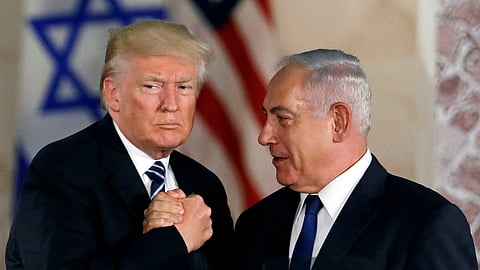

Former US President and current Republican presidential nominee Donald Trump is facing controversy over alleged attempts to solicit foreign influence in the upcoming elections in November.
This comes amidst a severe humanitarian crisis in Gaza, with hundreds of thousands of Palestinian civilians killed, injured, or displaced due to the ongoing Israeli bombing campaign since the war broke out on Oct 7, 2023.
According to US media reports, the former President reportedly spoke with Israeli Prime Minister Benjamin Netanyahu, urging him to reject a ceasefire deal in Gaza over concerns that it could benefit his Democratic rival and Vice President Kamala Harris in the presidential election.
Veteran journalist and PBS NewsHour host Judy Woodruff said on her show: "The reporting is that former President Trump is on the phone with the Prime Minister of Israel, urging him not to cut a deal right now, because it’s believed it would help the Harris campaign."
It is unclear whether Woodruff was referring to a new report or referencing last week's reports about Trump's alleged conversation with the Israeli PM, which coincided with the subsequent collapse of ceasefire talks on Sunday.
The collapse occurred after Hamas rejected the latest US proposal, blaming Netanyahu for altering the terms.
"After being briefed by the mediators about what happened in the last round of talks in Doha, we once again came to the conclusion that Netanyahu is still putting obstacles in the way of reaching an agreement, and is setting new conditions and demands with the aim of undermining the mediators' efforts and prolonging the war," Hamas said in a statement, according to Axios.
Notably, senior Israeli officials told Axios that the Israeli leader had endorsed the US proposal, knowing that Hamas would reject it.
Last week, another Axios report revealed that Trump had spoken with Netanyahu on August 14, a day before the ceasefire talks. The Trump campaign declined to comment, while the Israeli Prime Minister's office denied that the call occurred.
When asked by the press on August 16 whether he encouraged Netanyahu to accept the ceasefire deal, Trump responded, "No, I didn't encourage him...I did encourage him to get this over with...But have victory, get your victory, and get it over with. It has to stop. The killing has to stop."
If confirmed, Trump's actions could potentially violate the Logan Act, which prohibits unauthorised US citizens from negotiating with foreign governments to influence their actions or policies.
Meanwhile, political watchdog and investigative journalism group American Muckrakers PAC filed a request with the DOJ and State Department on Tuesday to investigate Trump's potential Logan Act violation, citing news reports of his calls with the Israeli leader.
However, the application of the Logan Act has been rare and challenging, with few prosecutions or convictions historically.
The former US President and his campaign associates have a history of attempting to coerce foreign powers for electoral gains.
Russian state actors, reportedly under the direction of President Vladimir Putin, influenced the 2016 US presidential election, with four major investigations confirming these findings.
Among them, a report by Special Counsel Robert Mueller and a bipartisan Senate report concluded that the Trump campaign welcomed foreign assistance, violating established US election laws. Several individuals associated with the Trump campaign were convicted or indicted in connection with the Russia investigation, led by Mueller.
And in the lead-up to the 2020 election, Trump was caught pressuring Ukrainian President Volodymyr Zelenskyy to investigate Joe Biden and his son while withholding congressionally approved military aid to Ukraine, a move that ultimately led to the first of his two impeachments.